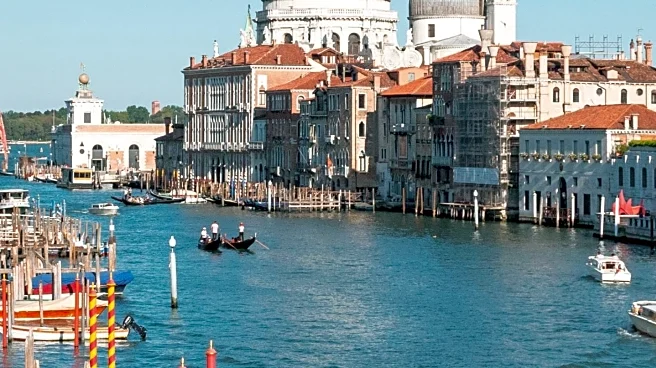What is the story about?
What's Happening?
A Polish tourist, Wiktoria Guzenda, fell into a canal in Venice, Italy, after allegedly being misled by Google Maps. The incident, captured in a viral Instagram video, shows Guzenda walking down stairs while using her phone, eventually slipping and falling into the water. The video also depicts Guzenda tending to scrapes on her leg sustained during the fall. The mishap has sparked ridicule and skepticism online, with some viewers questioning the reliability of Google Maps in Venice. Venice's unique navigation challenges, including its lack of traditional street addresses and unpredictable water levels, contribute to the app's unreliability in the city.
Why It's Important?
The incident underscores the limitations of digital navigation tools in complex urban environments like Venice. Google Maps' inability to account for Venice's unique layout and waterway system can lead to confusion and accidents for tourists. This highlights the need for alternative navigation methods, such as paper maps or local guides, to ensure safety and accuracy. The broader significance lies in the reliance on technology for navigation and the potential risks when technology fails to adapt to specific environments. Tourists and travel agencies may need to reconsider their dependence on digital maps in favor of more reliable, location-specific solutions.
What's Next?
Travel sites and local guides may increase efforts to educate tourists about the limitations of Google Maps in Venice. There could be a push for developing more accurate navigation apps tailored to Venice's unique geography. Additionally, tourists might be encouraged to use traditional navigation methods or hire local guides to avoid similar incidents. The event may also prompt Google to improve its mapping technology to better accommodate cities with complex layouts like Venice.
Beyond the Headlines
The incident raises questions about the ethical responsibility of tech companies to ensure their products are safe and reliable in all environments. It also highlights the cultural impact of technology on travel experiences, as tourists increasingly rely on digital tools for navigation. Long-term, this could lead to a shift in how travel technology is developed, prioritizing adaptability and accuracy in diverse settings.















